How to Avoid NFT Scams
Follow these simple rules to protect your money and stay safe in the NFT market

The vast majority of people in the NFT community are welcoming, kind, awesome human beings who have a shared passion for disruptive technology, cool art, fun games, and making money.
Unfortunately, the NFT market has also attracted a good amount of scammers because of its immature tech, lack of regulation, and the sheer amount of money that's entered the space.
There are a few simple rules you can follow to stay reasonably safe though, particularly related to these three important components of the NFT market:
- Your wallet.
- Marketplaces (I will focus on OpenSea in this guide).
- Communication channels (mainly Discord).
Disclaimer: You can never be too careful
Although I try to cover the most important components of your experience as an NFT market participant, there are still other interfaces and pathways for the scammers to try and exploit. I don't want you to read this guide and feel like you can just let your guard down!
Don't stop being skeptical, doing your due diligence and background checks on new projects, and staying up-to-date on which scams to look out for.
I also recommend you read other people's advice, including this great guide by Maï Akiyoshï. I found it as I was wrapping up this one and noticed that we cover a lot of the same things. Maï also gives advice on how to avoid copied art and some other important things though, so it's definitely worth a read.
With all that said, here are my rules for staying safe and avoiding scams in the NFT market.
1. Wallet safety 101: Keep your private key PRIVATE
Let's just kick things off with one of the simplest yet most powerful rules. Except when you're first setting up MetaMask, Phantom, or another wallet, or importing it to a new device or browser, you should never have to enter your private key.
If you land on some NFT website and a popup appearing to be the MetaMask wallet asks you to enter your private key, don't! If someone who claims to be a MetaMask support staff member asks you to share your private key, don't!
In general, don't ever share your private key, your secret recovery phrase, your seed phrase, or any similar kind of private information with anyone! Period!
Furthermore, don't store your private key on your computer or another device where scammers and hackers can get access to it!
2. Avoid scams on OpenSea
OpenSea is the largest NFT marketplace by far, making it a great place to discover cool art and collectibles. It's also a fairly open marketplace though, making it easy for scammers to create fake collections and try to steal your money. Because of this, the key to staying safe on OpenSea is making sure you avoid scam collections.
1. Buy from verified collections
The safest way to avoid scams on OpenSea is to buy NFTs from collections that have been verified as authentic and trustworthy by OpenSea itself. Just look for the 'Verified' badge in rankings, search results, and on the collections' own pages, and check the confirmation on hover as well.

When you buy from a verified collection, you can feel very confident that you're not getting scammed. That a collection isn't verified doesn't mean it's a scam though! It can take weeks or months for completely legit collections to get verified because of OpenSea's manual process and their requirements for a collection to get verified, including a certain level of sales volume. For the collections that aren't verified, you have a few other rules to follow.
2. Buy from verified creators
In addition to verifying collections, OpenSea also verifies creators on their platform. The Encryptas collection by CypherCHK provides an example of a collection that hasn't yet been verified, perhaps because of lacking sales volume, while the creator has. I like this feature of OpenSea because it lets verified creators get instant credibility for any new collections they may launch in the future instead of having to wait for the verification process of their new work.
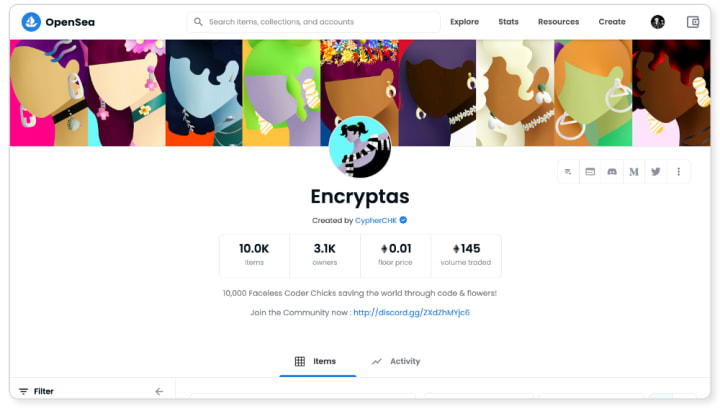
Just like with the collections though, many great creators aren't yet verified on OpenSea. Thus, we need some other ways to ensure our safety on the platform.
3. Follow OpenSea links directly from the trusted source
Instead of going to OpenSea and searching for the collection you're looking for, a much better approach is to follow the link provided by the creators themselves. You can usually find this link on a project's website, but an even better place is in their Discord server where most projects will have a channel called something like 'official links'.
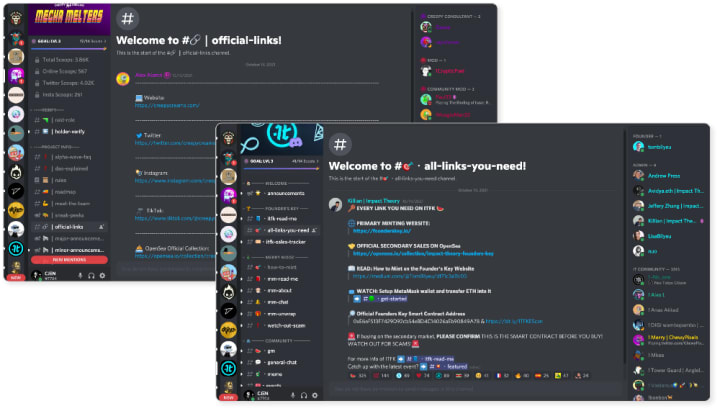
And hey, if you plan on revisiting a collection on OpenSea, you might as well bookmark the link once you've found the real one!
Now, if you do discover an interesting project directly on OpenSea or via another source, and you want to verify for yourself if it's a scam or not, there are a few things to look for.
4. Learn to spot a scam on OpenSea
Once you've seen a few of them, fake NFT collections on OpenSea will actually be pretty easy to spot. They all have one or more of the following traits in common:
- Small collection size. Most scammers can't be bothered to create thousands of NFTs like the real creators, so scam collections will often have a much lower number of NFTs than the original.
- Low prices. Scam collections will often try to lure people in by offering what seems like incredibly good deals for those NFTs. If you have some sense of what NFTs in a given collection normally sell for, you can pretty easily spot a scam this way.
- Low or no sales volume. Scam collections will typically have much lower sales volume than the originals because of their much lower prices and the fact that they hopefully haven't been able to sell nearly as many NFTs as the real ones. An important exception here is when a scam collection is created right when or even before a new project launches, so be extra careful right around launch time!
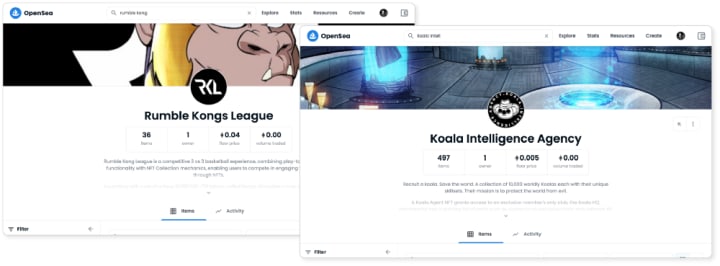
- Different currency. Scam collections will often create their NFTs on the Polygon network. The prices of such NFTs are represented by a purple Ethereum symbol rather than the traditional grey. It will also say 'ETH on Polygon' when you hover over it. Again, not all NFTs created on the Polygon network are scams, but it's a pretty strong sign in conjunction with the other scam characteristics mentioned.
- No NFT description or properties. Another place where scammers show their laziness is in the lack of description and so-called 'properties' of an individual NFT. Properties refer to the background color, fur type, clothing, hat, etc., and are listed under the 'Properties' panel on OpenSea. This along, with the description above it, will often be completely missing on scam NFTs.

5. Don't touch anything that's been sent to you for free
Some scammers will actually send you free NFTs! How nice of them! Well, these NFTs are really created to scam you, but they're only able to do so if you interact with them. Don't try to sell them, don't try to send them anywhere else, don't do anything with them!
OpenSea has already changed its settings so that anything that's sent to you will automatically be placed under the 'Hidden' tab on your OpenSea profile. And that's exactly where these scam NFTs should stay!
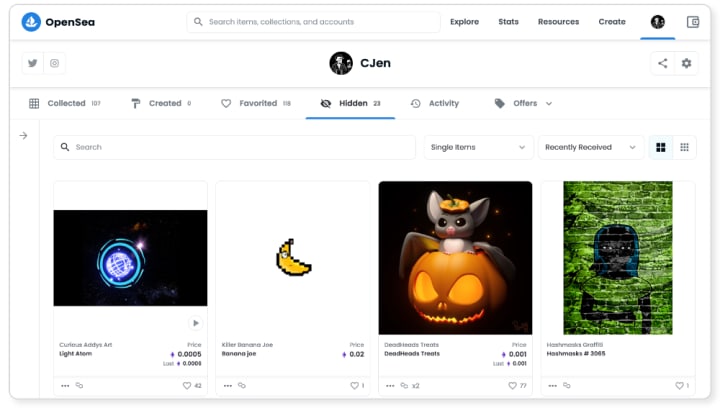
Not everything that's sent to you for free is a scam though, and legit NFT projects regularly do free airdrops to their holders. If they do, you will know about it from Discord and be able to confirm that the new NFT that suddenly showed up in your wallet is actually worth 'Unhiding'.
3. Keep your Discord and email inbox safe
Discord is where all NFT projects, networks, groups, and even marketplaces like OpenSea communicate with their communities and where community members communicate with each other. However, it's also a place where bad actors try to scam people.
Here's how you can protect yourself:
1. Turn off direct messages on Discord
You only need to join a few NFT Discord servers to start getting bombarded by direct messages from random strangers. Most of them invite you to new NFT projects' Discord servers and are just spam rather than actual scams.
Many of them do try to scam you though, by pretending to give you early access to mint a new NFT launch or offer you a special discount or help you out in some way. "All you gotta do is follow this special link…"
You could just ignore your direct messages or at least avoid clicking any links in them, but the safest approach is to simply turn off direct messages in your Discord settings. You will have to turn them on temporarily once in a while to interact with a verification bot or communicate with someone you trust, but the process only requires a few clicks and the extra hassle is well worth it.

2. Follow OpenSea's safety guidelines on Discord
OpenSea has its own Discord server with more than 160,000 members. It can be a great place to get help, either from OpenSea staff members or other users. A few scammers will try to take advantage of this environment though, by pretending to be support staff or just extra helpful. Therefore, it pays to follow OpenSea's own guidelines which you can find in the 'trust-and-safety' channel on Discord:

OpenSea staff will never:
- Contact you in DMs first
- Ask for your wallet seed phrase
- Invite you to a different server
- Ask you to click a link to "fix" your wallet
3. Be wary of links on Discord
Scammers on Discord will sometimes post a link to an NFT from a fake collection like the ones I covered earlier, hoping that someone will rush in and buy it before doing their due diligence. Or they will post a link to what they claim is the actual project's website, which then prompts you to buy an NFT by connecting your MetaMask wallet and so on…
If you follow a link posted in an open chat on Discord, at least triple-check that it leads to something legit and trustworthy before doing anything.
4. Be wary of people on Discord
To make our lives even more difficult, many link-sharing scammers on Discord will pretend to be someone they're not. For instance, they will change their name and profile picture to that of a moderator or another trusted person in the given Discord server. Please look out for any slight differences in their names or click them to see their actual 'roles' on Discord.
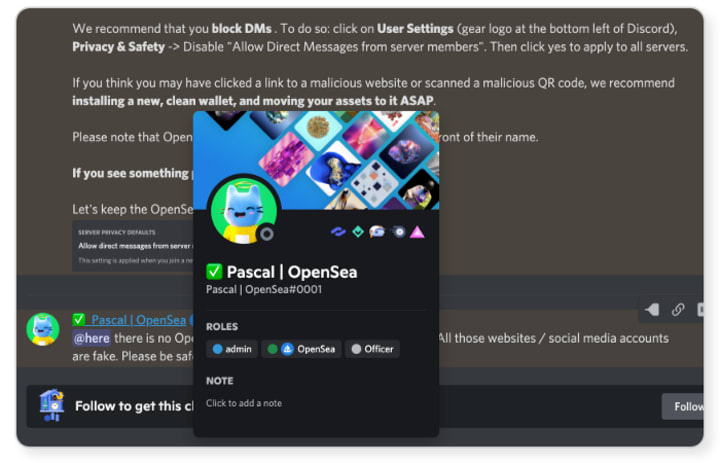
Unless a moderator's Discord account gets hacked, which has unfortunately happened a few times, the above should keep us safe.
5. Don't click links in OpenSea emails
Once you've started using OpenSea and bought your first few NFTs, you'll likely begin receiving offers from other collectors on the platform. OpenSea will by default send you an email whenever you receive such an offer, showing the item, the bid, and a button that links to the given NFT.
It's a very nice feature! However…
Scam emails are one of the oldest tools in the scammer's toolkit, so it's no surprise that they've found their way into the NFT space as well. I've heard about people receiving emails like the one described above, looking exactly like the real deal - except it's not and the button doesn't link to OpenSea at all! Instead, it takes you to another website, perhaps one that looks like OpenSea, which then asks you to connect your wallet, enter your password or private key, or compromise yourself in some other way.

Although it's probably completely legit when you get an email like this, the safe approach is to just manually go to OpenSea and check the bids you've received. You can see all the offers you've received under the 'Offers' tab on your profile or directly on the page of a given NFT.
I'm sure there are other OpenSea scam emails out there, giving you a "special offer", requiring some action from you to keep your account safe or active, or something like that. Just remember to generally be very skeptical of emails that appear to be from OpenSea, MetaMask, and similar important tools.
A quick note on rug pulls
Another common way that scammers try to steal your money in the NFT space is with the so-called rug pull. They basically create what appears to be a legit project with art samples, a roadmap, website, Twitter profile, and an active Discord server. And then, right after launch when you and thousands of other people have "bought" an NFT from their website, they disappear with the money and leave you with a useless and worthless NFT or nothing at all.
Having been rug pulled a couple of times myself, I know from experience that this type of scam can be fairly hard to spot in advance. I will compile what I've learned from my own losses and those of others and create a separate guide on how to avoid rug pulls. For now, I suggest you do some research on the topic if you're interested in minting new NFT launches and just leave you with some general advice:
- Be very cautious and skeptical of new NFT projects. If they sound too good to be true, they probably are. Do as much research as you can, particularly on the people behind it, before investing in a new project.
- Don't spend any money you can't afford to lose. This is pretty sound advice in general but especially important in a risky market like this.
Closing thoughts
People in the crypto and NFT space have long been familiar with the saying "The higher the risk, the higher the reward." If you're buying NFTs right now, you're one of the early adopters who have put yourself in a position to potentially get that high reward - but also take on the extra risk.
Getting scammed is certainly one of the risks in the NFT space but you can do a lot to protect yourself by following a few simple rules:
- Never share the private key to your wallet and don't store it on a digital device where scammers and hackers can get access to it.
- Learn to avoid scam collections on OpenSea and other marketplaces, either by sticking to collections and creators that have been verified or by looking for certain characteristics that all the scam collections share.
- Keep your Discord and email inbox safe by turning off DMs, following OpenSea's safety guidelines, and avoiding clicking suspicious (or any) links shared with you.
Rug pulls are a certain type of scam that's worth being aware of as well. I will save the in-depth coverage for an upcoming article and just encourage you to read up on the topic before participating in a new launch. Until then, don't hesitate to reach out with any questions or advice you may have! Stay safe!
About the Creator
Christian Jensen
I’m a designer, investor, and crypto nerd, writing about the intersection of creativity, culture, technology, and finance.
#NotFinancialAdvice



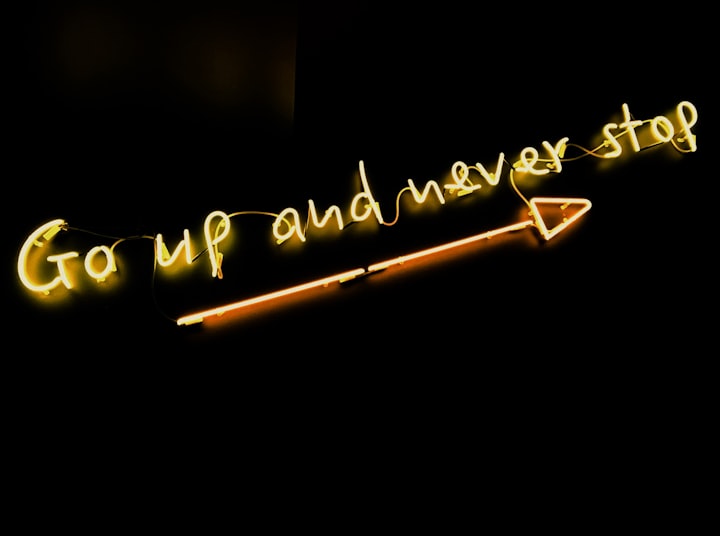


Comments
There are no comments for this story
Be the first to respond and start the conversation.